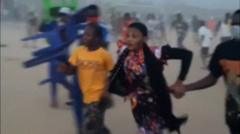This website uses cookies so that we can provide you with the best user experience possible. Cookie information is stored in your browser and performs functions such as recognising you when you return to our website and helping our team to understand which sections of the website you find most interesting and useful.


At least 56 people have been killed in a crush at a football match in Guinea's second-largest city, Nzérékoré, the government says.
Some reports indicate that events unravelled following a decision by the referee, who sent off two players from the visiting team, Labé, and awarded a controversial penalty kick.
An inquiry is being launched to find those responsible, Prime Minister Oury Bah said in a statement, calling the events "tragic" and offering his condolences to the bereaved.
One doctor, who did not want to be named, told AFP news agency there were "bodies lined up as far as the eye can see in the hospital".
"Others are lying on the floor in the hallways. The morgue is full," he added.
Local media said police had used tear gas after supporters of the visiting team, Labé, threw stones towards the pitch in anger at the referee.
"It all started with a contested decision by the referee. Then fans invaded the pitch," one witness told AFP.
Videos and images on social media verified by the BBC show chaotic scenes outside the stadium, with large crowds attempting to climb over walls and numerous bodies on the ground.
Some of those lying unresponsive on the ground appear to be children.
Paul Sakouvogi, a local journalist in Nzérékoré, told the BBC that internet access in the region had been restricted, and that police were guarding the entrance to the hospital where the injured were being treated.
"I observed six police pick-ups positioned in front of the three entrances to the hospital. They allowed only the medical staff to access the hospital, while the others were told to go back the way they came."
Prime Minister Bah has paid tribute to the dozens of people killed and promised full medical and psychological support to all those injured.
Guinea's football body, Feguifoot, has called it a moment of "intense pain" and said that football is meant to "unite hearts and bring minds closer" not cause "tragedy and grief".
"May the souls of the departed rest in eternal peace," said the Confederation of African Football (CAF) in a statement from its president, Patrice Motsepe.
Guinea is one of several countries - including Ethiopia, Gambia, Chad, Sierra Leone - that are currently banned from holding international football matches because CAF says its venues do not meet international standards.
That meant that when Guinea took part in recent Africa Cup of Nations qualifiers, all their home matches had to be held in neighbouring Ivory Coast.
Increased scrutiny
Thousands of spectators were present when the crush happened at a match between Nzérékoré and Labé, local news website MediaGuinée reported.
Sunday's match was part of a tournament in honour of President Mamady Doumbouya, who seized power in a coup in September 2021.
The opposition says the matches are part of a wider campaign to drum up support for the junta leader ahead of a possible run for the presidency.
On Monday, the opposition group National Alliance for Change and Democracy also accused the authorities of having "significant responsibility for these grave events".
The government has not responded to this.
In recent months there has been increased scrutiny of powerful figures in Guinean football.
In July, Aboubacar Sampil, who is president of the country’s football body Feguifoot, became the subject of an investigation into corruption and violence in football.
A junior colleague accused Mr Sampil, who also leads the board of directors for local team ASK, of facilitating violence and trying to influence referees at a match that ASK was losing 1-0 to Milo FC.
The latter team had to abandon the game and had trouble leaving the ground safely, according to documents filed to Feguifoot’s ethics body.
Among other things, Mr Sampil has also been accused of bypassing protocol and unliterally appointing people to jobs.
He has always denied any wrongdoing.
Additional reporting by Armand Mouko and Richard Irvine-Brown



 Africana55 Radio
Africana55 Radio 
